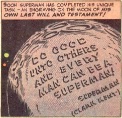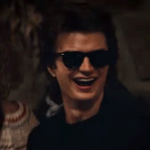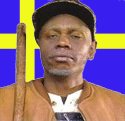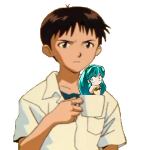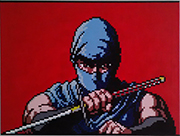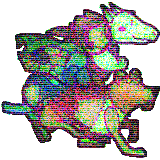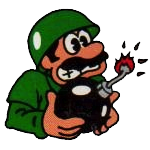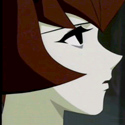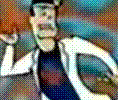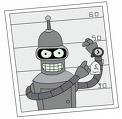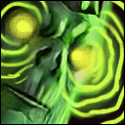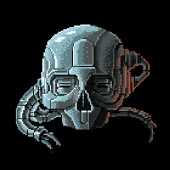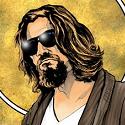|
Exitlights posted:but I guess Heinlein didn't get his fill of depicting deviant sexual relationships. Hoo boy you got that right.
|
|
|
|

|
| # ? May 29, 2024 15:20 |
|
Exitlights posted:So much about the story just felt unnecessary, and the open sexuality blended with the occasional dash of homophobia just made whatever point Heinlein was trying to make seem hollow. I think the open sexuality was actually the point of the novel. Apparently the word "polyamory" was coined by a group that patterned itself after Valentine Smith's fictional cult: http://www.serolynne.com/heinlein.htm
|
|
|
|
Jack Glass by Adam Roberts. I gave it 4 stars on Goodreads:me on Goodreads posted:A sci-fi novel in the form of three how-dunnits. Yes, how, not who.
|
|
|
|
Exitlights posted:Just finished Stranger in a Strange Land, and god, what a horrible book. Imagine my surprise to see it on any list of popular science fiction... I actually feel less inclined to read more sci-fi now that I've endured that. So much about the story just felt unnecessary, and the open sexuality blended with the occasional dash of homophobia just made whatever point Heinlein was trying to make seem hollow. Really, it could have ended at the conclusion of the first half, but I guess Heinlein didn't get his fill of depicting deviant sexual relationships. I totally agree actually. I loathed the last half of the book, when it was just annoyingly preachy and pretentious and all about sex. The first half was occasionally good, but Heinlein went off the deep end in the last half. And basically no plot at all in the last half. Read The Puppet Masters, if you haven't. That's Heinlein actually being good. But, yeah, I loathed Stranger in a Strange Land.
|
|
|
|
Ulio posted:Fight Club, is probably the best one from the bunch, really recommend it to anyone who hasn't read it yet or watched the movie adaption. My first time reading and I shamefully admit to have never watched it. There is only three characters but only one you really get to know, the narrator and through him Tyler. The themes about Anarchy, Consumerism and Psychology towards the end are powerful. This was my only Palahniuk book, looking forward to reading something else of his, though this is considered his best it seems. Hopefully by not much... I feel like the movie was better than the book, I want to say the author has even agreed with that. Personally I think Choke was a better book, although I never saw the movie. I stopped reading his stuff around Lullaby or thereabouts.
|
|
|
|
I loved the book and the movie, but the movie eeks out Fight Club the book just a little bit. Book had better Marla/narrator interaction and overall story. But, the movie has that ending sequence, which is probably one of the most beautifully perfect shot scenes in film history.
|
|
|
|
|
 Mr. Blandings Builds His Dream House (1946) - Eric Hodgins, William Steig The novel that inspired the 1948 film with Cary Grant, Myrna Loy and Melvyn Douglas. As you might guess, the film eclipses the novel. The novel is still a pleasant enough read and William Steig's witty illustrations are pretty well worth the price of admission all by themselves. But the film is the essential, so perfectly cast is it. You won't regret reading the book, but neither will you regret just watching the movie again instead. Madame Doubtfire (1987) - Anne Fine The book inspired the Robin Williams film, of course, but is quite different. It isn't a long book, at less than 200 pages, but it's more serious and more realistic than the frantic and silly film. It's also set in England, rather than the US. Williams and, to a lesser degree, Sally Field, make the film as great as it is. Without them, the holes in the plot are more obvious. One appreciates the more legitimate emotion here, but the movie is still the way to go for this story. About a Boy (1998) - Nick Hornby It was the film version of this novel that introduced me to the acerbic, cynical, tender and romantic worldview of Nick Hornby and, years later, I've never looked back; he's one of Britain's finest living writers, able to cut through the preciousness to find a beating human heart, able to be sentimental without being maudlin, hopeful without being silly, sarcastic without being mean and honest without being vulgar. The movie version of this novel, which features Hugh Grant's one truly great film performance and a winning juvenile performance from Nicholas Hoult, now all grown up and turned blue for the X-Men movies, is a great flick. But the novel eclipses it completely. It has everything the film has and more; the sense of time and place is stronger, the emotion deeper, the characters even more finely drawn than in the film. If you've not yet experienced Hornby's masterful writing, this is a fantastic place to start. Extreme Measures (1991) Ė Michael Palmer I am not a huge aficionado of the medical thriller genre, but, in a pinch, Iíll take Michael Palmer over the more successful and popular Robin Cook any day of the week. This is probably Palmerís most famous novel, mainly because it inspired a fairly successful film starring Hugh Grant and Gene Hackman. The film version bears little resemblance to the novel, however, basically taking the title and little else. But the book plays on the average personís fear of medicine; a group of powerful doctors have formed a secret society called Caduceus and, when it benefits the groupís research into experimental cures, they are not above lying to patients and treating patients in a way that actively harms them or puts them at risk. The book is a genre piece and nothing more; donít go here looking for great literature. But itís entertaining and a brisk pace keeps the book moving along nicely.  Savage Spawn: Reflections on Violent Children (1999) Ė Jonathan Kellerman Before he became a thriller author, Kellerman was a specialist in child psychology and he returns to that well in this non-fiction volume, which looks at violence among the young; he explores some possible causes and factors and also deals with the proper response of a society to violent youth. Kellerman has written a book you will probably not entirely agree with, but heís also written an interesting perspective on the issue. Kellerman is creating villains here that might fit into his novels and you will be excused for finding his views frighteningly jaundiced, not to say downright cynical. I suppose this is best read as part of a conversation, but itís short, brisk and has none of the typical stylistic problems of books of its type. Thereís not much new here, but the tone is refreshing and itís easily understandable by the layperson and is thus kind of a good introduction to sociological writing, which is often pretty obtuse and esoteric.
|
|
|
|
Nothing Lasts Forever - Roderick Thorpe Yes, the novel that gave us Die Hard. Not a bad read once you can separate John McClane from Joe Leland. Though it's a very close adaptation of the action sequences, I was only able to follow them because I had seen the movie. Some of the sequences were erratic and difficult to follow. Even after reading them a few times it was still unclear how Leland was able to do pull something off (the infamous air vent scene comes to mind). The Good: We get more of a glimpse of Leland's life than we do McClane's (more depth than just New York Cop) as well as his internal thought process. After Leland's first kill, he gets physically sick. We only see things through Leland's perspective, while there is some banter between Anton Gruber and Leland, it definitely ups the tension in the cat and mouse game that anything could happen at any time and further isolates Leland. The Different: Leland is older, probably Bruce Willis' age now, it's never expressly stated. Gruber and Co. are straight up terrorists / freedom fighters with political motivations instead of that being a mask for a robbery. The media circus plays more of a roll. Stephanie Genarro is Leland's daughter who brought her kids to a decadent cocaine-fueled Christmas party. Klaxon Oil instead of Nakatomi Corporation. The Bad: We only see things through Leland's perspective. Kathi Logan.
|
|
|
|
Broken Harbor by Tana French. It's the fourth book of hers, and it was outstanding as expected. While she is repeating some themes from previous books (cop, things that happened when they were kids, current events that reflect it) it was still a fantastic read. One of those books you wish you could keep reading even though the storyline is finished, because she really brings the characters and the setting to life and you want to remain there for longer. Assassin by Tom Cain. Fun, fun read. Basically Lee Child's Reacher books, with lots of action and manly men and firefights and bad guys and all that poo poo. And as with the Reacher books, a real pleasure when you are just looking to be entertained and not for the next Tolstoy. Ready Player One by Ernest Cline. Very geeky, fun, and creative story. Guy creates a huge online game that most of mankind is addicted to, dies and leaves behind a mystery to be solved. Lots of 1980s references, old school computer gaming, written by someone who clearly loves the stuff and it shows. Not great literature by any means, but a great vacation book and I look forward to what this guy might write next. Basically it is what Daemon should have been instead of the giant turd it ended up... Age of Miracles by Karen Thompson. Sci-fi-ish book with a neat concept: Earth starts to slow its rotation and the days and nights keep getting longer. How will people and society react and adapt? Unfortunately it is a little light on the science bits, which is a bit of a downer, but the story is still a good one and it was a pleasant read overall.
|
|
|
|
Clayton Bigsby posted:Ready Player One by Ernest Cline. Awww, I loved Daemon (and the rest of his books). What do you think made Daemon a turd? I'll definitely check this out though.
|
|
|
|
The Count of Monte Cristo - Alexandre Dumas This book is just a beast. It took me quite some time to get through it, but it was a very rewarding experience. A common criticism that I've heard is that the middle part is boring and yeah, it does slow down quite a bit as well as introducing a ton of new characters whose relevance to the plot isn't immediately known. However, the slow pacing in the middle didn't bug me too much since it's apparent that much of what is happening is all part of a larger, calculated plan by a man who is hellbent on getting his revenge. And that's what kept me hooked from chapter to chapter. As large as the book was, I never felt that there was much padding, outside of Dumas' love of describing locations and scenary in great detail over and over. But this isn't the first Dumas work that I've read so I knew to expect that. It's the sort of padding I don't mind anyways. In short, I had a drat good time reading it and it's considered a classic for good reasons. As an aside, does anyone happen to know the major parts that were removed in the abridged version? I read the unabridged version of course but I know some people that read the abridged version and had a different experience than myself, so I was curious.
|
|
|
|
School doesn't leave me with a lot of time for reading anything but papers, but I just finished Saturn's Children by Charles Stross and washed it down with Bolo Brigade by William H. Keith. I'm not really up for heavy reading this fall, so it's probably going to be lightweight, schlocky-but-fun sci-fi for the next month or two.  Srice posted:The Count of Monte Cristo - Alexandre Dumas Monte Cristo is definitely my favorite Dumas. It's hard to give a good answer to that, though - there's different translations of it, some of which change things, and I'm pretty sure there's more than one abridged version as well! I read the abridged version as a kid and I don't remember any major plot points missing, but with a ten year gap between reading the abridged and full versions I could easily miss some major stuff.
|
|
|
|
ToxicFrog posted:Monte Cristo is definitely my favorite Dumas. Yeah, it really depends on which version. My first experience with Dumas was The Three Musketeers as a kid, but it was a kiddie version where they cut ALL the character development and just left the action. It ended up with me thinking Dumas was a hack who wrote one-dimensional characters. Boy was I wrong. Just finished The Count of Montecristo (unabridged version on Project Gutenburg), and it's amazing.
|
|
|
|
Pompous Rhombus posted:Personally I think Choke was a better book, although I never saw the movie. I stopped reading his stuff around Lullaby or thereabouts. Heard Haunted is not bad also. Pompous Rhombus posted:I feel like the movie was better than the book, I want to say the author has even agreed with that. Loving Life Partner posted:But, the movie has that ending sequence, which is probably one of the most beautifully perfect shot scenes in film history. Definitely going to watch the movie too.
|
|
|
|
musclecoder posted:Awww, I loved Daemon (and the rest of his books). What do you think made Daemon a turd? I'll definitely check this out though. Well, I thought the first parts were entertaining enough, but halfway through I realized all the characters were two-dimensional a-holes and I really did not care what happened to anyone. The plot was OK at first but completely derailed into ridiculous. Once the sword wielding robot motorcycles and such arrived I really could not pretend to enjoy it anymore. It was as if Dan Brown had become a computer nerd.
|
|
|
|
I received in the mail yesterday, started this morning, and finished about twenty minutes ago the tenth book in the How to Train Your Dragon series, How to Snatch a Dragon's Jewel. That is some powerful fuckin' writing. Starting a couple years ago with #8 - How to Break a Dragon's Heart, I've made it kind of a thing to dedicate a day to these books as soon as I get them. Y'know, bottle of wine, pinch of ganja, scotch whisky, whatever, a "book and vices" day, but drat. I mean this is kinda TCC, but not even kidding: no matter what I drink or smoke or whatever, the writing, the tension, it just completely sobers me up by the time I'm finished. I don't consider it a waste. It just speaks of the amazing storytelling. The only thing better than a fine wine is a good book. And you know what? Under the dragons and children's lit and dragons and vikings and dragons and heroes and villains and dragons, it's a tale of the bloody, fiery, violent revolution required to topple tyrants and enter an age of enlightenment. poo poo, I don't want to have to wait another year for the final-final book, but it looks like I haven't really got a choice. Fur20 fucked around with this message at 23:56 on Oct 2, 2012 |
|
|
|
The Rasputin File, by Edvard Radzinsky. A biography of the eponymous monk. The file in question refers to documents compiled by investigators instigated by the provisional government following the revolution, intended to show how debauched the last tsar's regime had become (thereby justifying the revolution post hoc). The author's quest for this file spanned decades, and was valuable for containing what was unavailable from any other source: testimony of followers and friends of Rasputin, who was at the time of his death the most hated man in Russia. All I really knew about Rasputin came from that Boney M song, so virtually everything in this book was new to me: the semi-feudal state of Russian empire at the dawn of WWI; the religious, superstitious, and mystical leanings of the russian people; the semi-literate siberian peasant's power over the tsar's wife, and, through her, over the tsar and his decision making during wartime; alongside the primitive state of the russian economy and social organization, the surprisingly modern state of their secret police. The author is a playwright, not an academic historian, and it shows in the prose: despite (or maybe due to) the translation, the narrative really crackles. Here's what the NYT had to say: quote:This work is a gripping tale of Rasputin's ascent to power, a story almost Tolstoyan in its complexities and ironies, as royal relatives and hangers-on enter and exit the stage. Sometimes the trees of intrigue overshadow the forest of a nation's fate, but the reader's concentration is fortunately aided by a prefatory guide to all the main characters and a genealogical table of the Romanovs. Radzinsky does not flinch from scandal about the marital breakups, the drunken orgies and the liaisons of all sorts that crisscrossed the Russian court. Even though this isn't an academic biography, I feel like the author stays true to the sources, and although he speculates freely (eg on Rasputin's state of mind, on his enemies' motivations, on events where no eyewitness testimony exists) he is careful to preface these speculations for what they are. This is a great book, full of weirdness and drama and tension.
|
|
|
|
Srice posted:The Count of Monte Cristo - Alexandre Dumas When I read this in AP Literature, our teacher broke it out in to 18 parts as best she could ( to match up with the 18 parts of the serial publication) - so we read it as a "long term project" between January and May. It made it much easier to digest and read and discuss. This is on my list as a book to re-read.
|
|
|
|
City of Thieves by David Benioff. Started and finished this today. It's a pretty good coming of age story with a fair amount of dark war-time humor spliced in there. I like the repeated mentioning of fairy-tales to make Lev seem even more boyish and naive. Anyone with a mild interest in 1940's Russia would like this, despite it being pure fiction. The writing is very vivid and describes the cold, hunger, and misery of Leningrad during the siege. It's only 250 pages so it is a quick read, and I heard scuttle-butt of a movie in the works.
|
|
|
|
The Night Circus by Erin Morgenstern. I liked this a lot. It revolves around a magician's duel that unfolds over the course of a decade, centered on a fantastical circus. She blends fantastical elements into turn of the century England and America very well, and the prose is generally good and excellent in places. It reminds me of The Prestige, Jonathan Strange and Mister Norrell, and some of Neil Gaiman's modern fairy tales. This is her first book; I'll definitely read her next.
|
|
|
|
Cadillac Desert (1993) - Marc Reisner In the West, of course, where water is concerned, logic and reason have never figured very prominently in the scheme of things. As long as we maintain a civilization in a semidesert with a desert heart, the yearning to civilize more of it will always be there. The simple need for water is incontrovertible. We will, quite simply, die without enough of it. And while it may seem in this modern era that water isnít an issue any more, at least not to those of us in the United States, Reisner shatters that myth. The idea of simply turning on the tap and finding water there is one weíve grown up with; however, that water itself is still a scant resource and the fact that weíve invented more efficient ways of transporting it doesnít change the fact that it isnít a resource that is simply not renewing as fast as weíre using it. On the face of it, one wonders if a book about the political and social history of water in the United States might be a little dry, pun very much intended. If you tried to read Hundleyís The Great Thirst, youíll be afraid to pick this book up. But put Hundley out of your mind; Reisner has a gift for prose that sings. The book is filled with prose that ascends to the beauty of poetry and I can honestly say that I laughed out loud at least five times to a chapter. Reisner has an eye for the absurd and thereís certainly enough of it going on in this book to feed the humor mill. Besides that, Reisner has a wicked voice of sarcasm and he applies it to the federal government and its actions with a satirical bent that is sure to set even the most humorless into a couple of laughing jags. There are still people who say they hate history or hate non-fiction books; this is one of the books to point them towards if you want to see them change their tune in a hurry. Itís a story, a story that stretches over centuries, but a story nonetheless and with characters as vibrant as any that could have been dreamed up by a fiction writer. John Muir, William Mulholland and his occasionally corrupt efforts to build Los Angeles, two brothers in a small town in Owens Valley who steadfastly resist the efforts of Los Angeles to take their water, perhaps most stunning of all the hilariously irascible and pungently anti-heroic Floyd Dominy, head of the Bureau of Reclamation. Even Reisner, for all his attempts to keep things moving, canít help but bog down and devote an entire forty page chapter to Dominy, giving not just the details of his career with the Reclamation but often entirely unrelated anecdotes about his foul mouth, sexual proclivities and all around hilarious philosophy of life. How can one not be fascinated by someone who, when asked about his tenure with the Bureau, flatly stated, ďI was the Messiah?Ē If this sounds like an epic novel, it very well could be. The section dealing with the growth of Los Angeles is begging for the miniseries treatment; there are lifelong friendships shattered and then reformed on the deathbed, there are standoffs with militia, there is sabotage of pipelines, there is industrial espionage of the most blatant kind and it all ends with a trumped up charge and jail time thatís politically motivated. If youíre not on the edge of your seat through this section, maybe real life isnít for you. This stuff is infinitely more suspenseful than most novels and the amusing thing is that we know how it comes out, at least, if youíre one of the few whoís actually heard of Los Angeles and happen to be aware that itís a booming metropolis. Iíll admit to even shedding a tear at that deathbed reunion scene. This isnít to say that Reisner is sappy or even pandering. Itís just that his readable prose flows into the eye like a voice flowing into the ear and the story comes across. Finally, the book devolves into an utter screed against the federal government and the war between the Corp of Engineers and the Bureau of Reclamation. Itís a simple fact that people cling to life. If people are like this, so are government agencies. And so, despite the fact that every conceivable dam had been built, the Bureau and the Corps had to justify their existence by continuing to build them in places that didnít need them, in places where the building of a dam actually made water transportation more difficult, not less, and occasionally in places where the terrain would not support a dam. This leads, in Reisnerís eyes, directly to the horrific Teton dam collapse in 1976. Reisner, writing about this collapse, ascends to levels of righteous indignation that pushes his prose to the level of apocalyptic. Itís like reading the book of Revelations in modern vernacular as he follows the sweep of water across Idaho, literally wiping towns off the map. For instance, Sugar City didnít show up on the next map publication. Reisnerís predictions look a bit off in the wake of twenty years of progress. He claims that the underground aquifers are being depleted at a tremendous rate (they are) and that the US will have to eventually abandon the desert states, having no pure water from underground and not enough facilities to either pump water in from the green states or desalinate ocean water. In a new afterword for a republication, he claims that disaster has been staved off this long because of changes in policy; whether thatís true or whether he simply overstated his case back in 86, itís up to the reader to decide. Most probably, it is a combination of the two. But the book isnít fascinating for what it predicts but for what it shows us about human nature and the desire to improve, about government bureaucracy and the will to survive, about history and the authority to break the law. Itís a book of history that becomes a book of deep social and psychological insight. Itís a staggering work, one of the great American non-fiction works of the twentieth century. It deserves to be rediscovered. 5 out of 5 stars.
|
|
|
|
Just finished reading the final book in the Second Chronicles of Thomas Covenant - White Gold Wielder, by Stephen Donaldson. This was certainly a great entry to the series, as were the previous two books. (I did enjoy all the travelling around in TOT, but I won't go into all that) But yeah, to the person who said that they finished the first two chronicles then stopped - sorry, I can't remember the username - I don't know how you did it, without wanting to continue to the Last Chronicles. (I mean, for one thing right at the end after Covenant blocks Foul's attempts at destroying the Arch of Time, he clearly states to Linden that he hasn't been destroyed, but only beaten back, again. Plus that the Sunbane would speed up his recovery, unless that particular wrong over the Land was removed.) But yeah, I'm definitely going to continue onto the Last Chronicles when I can find them. Although in the meantime, I found the first two books in The Gap Sequence in one volume on the cheap, so I'll try that first, I guess.
|
|
|
|
I finished the second book of C.S. Friedman's Coldfire Trilogy. I enjoyed this book a bit more than the last one I think. I thought the beginning was excellent from a writing perspective (a summary of the last book that makes sense from a plot perspective), though for the most part it took me longer to get into the book than the last one did. Weird. I'm gonna read a couple other books before I finish the trilogy, and then I think I'll take a break from fantasy for a couple books.Unfit For Space posted:I guess his classic SF novels would be considered to be Camp Concentration, 334, and On Wings of Song. I just got out The Dreams Our Stuff Is Made Of from the library again to see what he said that was supposedly so terrible, and I think you're overreacting a bit. His complaint isn't that feminism and multiculturalism are bad things, but that Le Guin wound up making her work more about her ideology than about good writing, which he explicitly says happened at some point to just about every classic SF writer irrespective of what their ideologies were. His personal beef with her is also pretty obvious, since it's mentioned right in his discussion of her work! Honestly, I don't feel like I came off that emotional or overreacting, but sorry if I did. I'll try and be more careful with my wording. Honestly if I hated it that much, I wouldn't have finished it. I guess part of it to me is that I've never seen that problem with Le Guin. Admittedly I've only read some Earthsea, so it's not like I've read most of her work or anything, but I've never seen anything about her ideologies getting in the way of her writing. Most of what I saw with Earthsea, she was fairly careful of that. I probably just have to read more to be able to have a more accurate opinion. Srice posted:The Count of Monte Cristo - Alexandre Dumas Oh man, that's one of my favorite books! Admittedly, I read (well, tried to read) the abridged B&N version some six years back. I never finished it. I can safely say that it's because it's boring. What I recall is that they cut out interesting bits and kept boring bits. I may not have had the best attention span as a stupid teenager but I'm pretty sure I would have still loved the unabridged version. But, anyway, my translators note from my penguin edition seemed to imply most translations are from a certain abridged version (it's either that or it's all the same translated abridged version, not gonna check), or he could have been slamming just that particular translation, but it honestly came off to me as the first. An actual snippet: quote:Still less acceptable, however, than the language of this Victorian translation is the huge number of omissions and bowdlerizations of Dumas' text. The latter include part of Franz's opium dream at the end of Chapter XXXI, some of the dialogue between Villefort and Madame Danglars in Chapter LXVII, and several parts of Chapter XCVII, on Eugenie (sorry not accenting this) and Louise's flight to Belgium. He goes on to discuss other instances. It may have been because I was a dense teenager, but it may also have taken it out (I can't check, I think I threw out the copy), but this note pretty much supports that most editions take out the suggestions of lesbianism. It looks like most take out quite a bit of stuff that wouldn't even have been "objectionable" like dialogue and descriptions. I seem to recall that the book was like 600 pages at the absolute most, but I'm leaning far lower. Man, I know you have to take stuff out for abridged versions, but the choices made really baffle me.
|
|
|
|
Just finished Leviathan Wakes (James S. A. Corey) Overall a really, really good read, although I wasn't particularly thrilled with the direction they decided to take it in towards the end because it seemed pretty cliched, at least for a person who has read as many sf/fantasy books as I have. Still, it was really a page-turner for all that it's very long, and that's a hard combination to pull off successfully--hats off to the authors for accomplishing it. I'll probably check out the sequel once I get through my current to-read list.
|
|
|
|
Finished American Psycho today. is all I have to say. is all I have to say.
|
|
|
|
Finished A Storm of Swords, the third book in the Song of Ice and Fire series. The second book had been a bit slow but was completely worth it for this, despite being a 1000+ page book in a series full of long-rear end books I was constantly hooked on wanting to know what came next. George R. R. Martin has a way of creating extremely diverse and interesting characters, which is even cooler given the scope of this series. My only real gripe is that I wish the series could've ended here - if all of the various conflicts and tensions had been allowed to come together and resolve within this book, it could have been one of the greatest books I ever read. As is, it's awesome, but there's sort of a TV-show-entering-its-zillionth-season vibe where THE BIGGEST CONFLICT EVER ends and yet there's immediately some other equally crazy thing that has to happen for the next season / book. I mean, after three consecutive thousand page books, shouldn't that be enough? I think that might come with the territory of the fantasy genre though, I'm not too well versed.
|
|
|
|
wlokos posted:My only real gripe is that I wish the series could've ended here - if all of the various conflicts and tensions had been allowed to come together and resolve within this book, it could have been one of the greatest books I ever read. As is, it's awesome, but there's sort of a TV-show-entering-its-zillionth-season vibe where THE BIGGEST CONFLICT EVER ends and yet there's immediately some other equally crazy thing that has to happen for the next season / book. While I'm holding out hope that somehow GRRM... a - Lives to finish the series b - Does so in a suitably awesome fashion ...I'm pretty much resigned to this having been the high-point of the series. Kekekela fucked around with this message at 04:21 on Oct 6, 2012 |
|
|
|
Zola posted:Just finished Leviathan Wakes (James S. A. Corey) Caliban's Gate is pretty good but not nearly as good as its predecessor. It does make me really curious to see what direction the third book will take.
|
|
|
|
Chiba City Blues posted:Finished American Psycho today. I read that one earlier this year, and I agree with your assessment.
|
|
|
|
 Finished this again yesterday. Book owns and the central tenet manages to avoid coming off as a ridiculous gimmick, instead coming off perfectly natural. It does drag a little towards the end but overall a very entertaining read.
|
|
|
|
Marco Polo: From Venice to Xanadu by Laurence Bergreen. The opening scene: a middle aged man, captured as a POW in the war with a rival city-state, passes his extremely boring captivity telling tales of his travels to the fabulous east. Another POW, a literate notary, proposes to write these tales down and publish them. This was the genesis of Polo's Travels. The next fifteen chapters tell the story of Polo's trip, from Venice to Armenia to Afghanistan to China to India to Africa and then finally back home after 20 years. What I wanted from this book I got: basically, I wanted Polo's Travels with an omnipotent narrator saying periodically "this is extremely unlikely" and "believe it or not, this actually happened and is attested to in some ancient Chinese records" and "this can't be true because he couldn't have gone in that direction". Luckily, Polo's sins are mostly those of exaggeration, not invention, and he comes out of this looking pretty good, and certainly his anecdotes and descriptions are much more interesting given their veracity. Bergreen mostly let's Polo do the talking, although I feel like he tries to impose his story on Polo's a little heavy-handedly in spots, and definitely in the final chapter. But never mind, it is still a terrific treatment of Polo, his travels, and the book.
|
|
|
|
Just finished Super Sad True Love Story by Gary Shteyngart. It's this quirky romantic tragicomedy set amongst the backdrop of a dystopian, near future US; the best way to describe it is a Lolita set in Dubya's Oceania, only everyone's legal. The story is done in a postmodernist split narrative; the leading man reads like the neurotic protagonist of the old Russian greats thrown into a world he no longer understands, while the leading lady comes through in a collection of chat logs. The story is brisk and moves very economically for a story with many interweaving subplots. Shteyngart has an amazing way with words; able to juggle two wildly different writing styles, bring levity to the baroque Russian style and fit pathos and humanity into the satirically vapid. It's packed full of re-readable sentences and paragraphs; some for quick wit, some for brazen absurdity, and some for simply beautiful language. One section about halfway through is particularly beautiful and uplifting. It is a love story, and there's some cunnilingus going down, so if that's not your thing you might want to stay away. If sexhavers don't scare you, you'll find a shining synthesis of postmodern playing with the literary form and old-world modernist heart in this book.
|
|
|
|
dokmo posted:Marco Polo: From Venice to Xanadu by Laurence Bergreen. The opening scene: a middle aged man, captured as a POW in the war with a rival city-state, passes his extremely boring captivity telling tales of his travels to the fabulous east. Another POW, a literate notary, proposes to write these tales down and publish them. This was the genesis of Polo's Travels. I read Penguin's edition of Marco Polo's Travels earlier this year and I kind of know what you mean. He led a hell of a life, probably travelling more extensively than anyone else before him, and if I remember right, most of the really crazy stuff in his book is about things he only heard about and didn't see. If you want to compare to something else from around that time that's completely crazy, check out The Travels of Sir John Mandeville which is full of people with dog's heads and the like.
|
|
|
|
The Story of the Stone, second of the Chronicles of Master Li and Number Ten Ox. It was ok, but overall I didn't like it nearly as much as The Bridge of Birds; the ending felt more like a tangled mess than like a brilliant reveal, and it felt like a lot of plot elements (such as an ancient, nearly immortal, evil ruler, an incarnate goddess without knowledge of her own nature, and a supernaturally attractive woman who has no memory, inspires no jealousy, and is actually a key figure in the mystery) were reused with minor variation. On to Eight Skilled Gentlemen.
|
|
|
|
Finished The Yiddish Policemen's Union mere minutes ago. Quite the book, but I think I missed quite a bit, so I'll have to re-read it at some point. Definitely going to check out some more of Chabon's stuff, though.
|
|
|
|
I just read Nicholas Nickelby by Charles Dickens. Per usual Dickens fair, a pleasant soap opera romp without any real plot twists or surprises with the characters: the rotten people stayed rotten and the good people stayed triumphant and the women cried and fainted a lot. It was enjoyable, but thick as hell for a casual read--but I quit my job recently, so what the hell else am I gonna do but pick up gigantic books?
|
|
|
|
The whole of O'Brien's Aubrey/Maturin sequence, which it's a brilliant set of books. Followed by Banks's Hydrogen Sonata, as usual with culture books left me devastated afterwards that I am going to be waiting god knows how long until the next one arrives.
|
|
|
|
I just finished reading This Book is Full of Spiders by David Wong. It was typical Wong fare, if you've read any of his Cracked articles or John Dies At The End you'll know what to expect. This story relies more on action and character motivation than absurdity, unlike John Dies. I don't think it was as good as the first, but they are very different in tone. It's not even necessary to read the first, actually, to enjoy Spiders.
|
|
|
|
laplace posted:I just finished reading This Book is Full of Spiders by David Wong. You notice the conspicuous lack of a certain "r" word?
|
|
|
|

|
| # ? May 29, 2024 15:20 |
|
funkybottoms posted:You notice the conspicuous lack of a certain "r" word? I haven't read JDATE in years and now you have me unsuccessfully racking my brain for unusual R words! Spiders is very high on my to-read list, might delve into it in between Gentlemen Bastards books.
|
|
|





